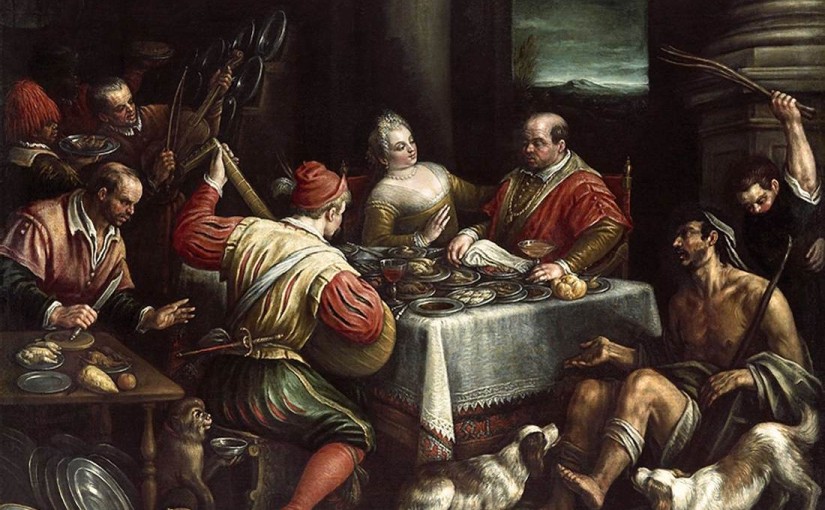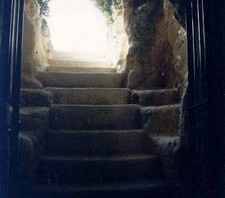Today’s readings
I love when our readings lead us down a path and we have them all figured out, and then out of the blue, we find out they mean something completely else! So here it is, brothers and sisters in Christ, I’ll just say it: this story about the raising of Lazarus isn’t really about Lazarus at all! I mean, look at the story: Lazarus is easily the least significant character in the whole episode. Even though he would seem to be the center of attention, he is dead for most of the story, never says anything himself, and Jesus only says three words to him in a five-minute reading. All of these are big red flags that the Gospel writer has been playing a little joke on us and the real story is somewhere else. I love it when that happens!
And it might be easy to accept that. Okay, the story isn’t about Lazarus, but it is about how Jesus can raise people from the dead, right? Well, yes and no – it depends on what you mean by dead, I guess. Certainly, Jesus has the power to raise people from any kind of death, we know that, but I absolutely don’t think that simply resuscitating people from physical death is what the story is about. Actually, even though the story talks about eternal life some day, I’m not even sure the story is even about that kind of death and life. After all, Jesus doesn’t wait until some future resurrection to bring Lazarus back to life; he does it now, right before our eyes. I think we have to look a little harder and find the life that is right here and now.
Maybe today’s first reading can shed some light on what Jesus was talking about by death. Here the people of Israel are, for all intents and purposes, alive. But they are in captivity in Babylon, so as a people – as a nation, they are pretty much dead. They have no place to worship, they are subject to the harsh cruelty of their captors, and their whole way of life is being systematically exterminated. That’s a kind of death that’s hard to miss. But even now, the prophet tells them, God will open their graves and have the people rise out of them. God will heal their affliction and give them life in spirit. The kind of life God will give to the Israelites is, as the Psalmist says, “mercy and fullness of redemption.”
So the kind of death we’re talking about here is a death that comes about as a result of our daily living. It’s a death brought on by situations in which we find ourselves. We experience death in too many forms to name. For example: wars have left scars for generations; poverty sucks the life out of families, neighborhoods and nations; conflicts divide Christians and set religions against one another; rivalries and ambition among church people give scandal to outsiders; rancor rips apart families; the innocent are abused, political corruption in poor countries depletes essential resources, and so much more. Jesus comes to bring life to people dead in those situations.
And there’s also a kind of spiritual death that St. Paul talks about in our second reading today. “But if Christ is in you,” he says, “although the body is dead because of sin, the spirit is alive because of righteousness. If the Spirit of the one who raised Jesus from the dead dwells in you, the one who raised Christ from the dead will give life to your mortal bodies also, through his Spirit dwelling in you.” We all experience some kind of spiritual death in our lives and it is so painful to deal with it. Patterns of sin drag us down from our relationship with God. Addictions tear us apart from our loved ones and from our Lord. Indifference, apathy, and even scandal break us away from the human family and from the Church. Jesus comes to bring life to all of us who struggle with sin and experience this kind of spiritual death.
And he brings life to us in these situations right now, if we will let him. He doesn’t wait until some far-off resurrection time to make it happen. In another place in the Gospel, Jesus makes it clear that life is his primary mission. “I have come that they might have life, and have it abundantly,” he tells us. Even so, Jesus is not put off by our death. As embarrassed as we may be about our own brokenness, as dejected and frustrated as we may be about our failure to drag ourselves out of the sin in which we find ourselves, Jesus still comes to us. Martha makes a big point about how Lazarus has been dead four days, as if there were nothing Jesus could do about it. That’s because the Jews believed the soul of a person hung around for three days, and after that he or she was really, really dead. But Jesus was able to raise Lazarus anyway. So it doesn’t matter how dead we are, because our death and our sin are never, never, never more powerful than the mercy of God. Never.
And the Tempter would try to convince us that we are not worthy of this kind of mercy and love and forgiveness and resurrection. He may convince us that, like Lazarus, we have a big heavy stone sealing us off from God. Our sins might seem that big sometimes. But Jesus will have none of that: “Roll away the stone,” he says. The Tempter might want us to be so embarrassed about our sin that we become convinced we actually stink of death, that there will surely be a stench. But Jesus assures us that if we believe, we will still see the glory of God and our stench will be dispelled by the breath of God’s Spirit. The Tempter might even make us think that our sins have bound us up so much – like Lazarus in his burial cloths – that we can’t even take a step forward to come out of our graves. But to all of that, Jesus says, “untie him and let him go!”
The Elect have been hearing special readings at the Masses they have attended these last three weeks. They are readings about our baptism, and so they relate well to the conversion they are experiencing and the preparations they are making for becoming one with us at the Easter Vigil in less than two weeks. But these are also readings for you and me, that we might look back at our own baptisms and recommit ourselves to our Lord once again. Conversion is something that goes on all of our lives if we are attentive to it.
So these readings have been incredible, particularly the ones from the Gospels. Each of these readings has been focused around one person who could well have been a catechumen, one of the elect, someone undergoing conversion to the faith. Two weeks ago, the woman at the well found Jesus to be the source of living water, a water that gave relief to the dryness of her faith. Last week, the man born blind washed in the pool at Siloam and came out able not only to physically see, but also to come to see Jesus as the way, the truth and the life. Today, I think, the Elect one is Martha. She experiences death in the grieving of her brother. But she comes to new life as Jesus attends to her faith and raises not just her brother, but her too, to new life. At the end of it, she goes to her sister Mary – this Mary who in a previous story sat at Jesus’ feet rather than help Martha cook for their guest but now refuses to even come out to see him. Martha has to go and tell the little white lie that Jesus is asking for her before Mary will leave the house. But this is how Martha witnesses to her faith, a faith which is made new and given new life with the raising of her beloved brother.
We’re all on different places of the journey in these closing days of Lent. Maybe, like Lazarus, we are all bound up, stinking of our sins, and sealed up in the tomb. Maybe, like Mary, we are hurt by all our resentments and refuse to even come out of the house. Maybe, like Martha, we have a fledgling faith and throw ourselves to Jesus asking to be made whole. Maybe, like the apostles, we don’t really get it, but are willing to go and die with Jesus anyway. Wherever we are, whatever our brokenness, whatever our sin, however long we have been dead and buried, Jesus comes to us today and beckons us to rise up and come out and be untied and to live anew.
And so, maybe in these closing days of Lent, we still have to respond to our
Lord’s call to live. Maybe you haven’t yet been to confession before Easter. We have confessions before and after next Saturday’s 5:00pm Mass, and then again on Tuesday the 30th at 7:30pm, and we invite you to come and have the stone rolled away and to be untied from your burial cloths. Perhaps in these last days of Lent, you have relationships you have to renew with the new life that Christ gives you. Wherever you find yourself, I urge you, don’t let Easter pass with you all bound up and sealed in the grave. Lent ends just before Vespers or Evening Prayer on Holy Thursday. That gives us around ten and a half days to take up our Lenten resolutions anew, or even make new ones, so that we can receive new life in Christ. Don’t spend these days in the grave. Come out, be untied, and be let go.


![Fifth Sunday of Lent [Scrutiny III]](https://father.mulcahy.net/wp-content/uploads/2010/06/cropped-IMG_1212-e1379750321530.jpg)
You must be logged in to post a comment.